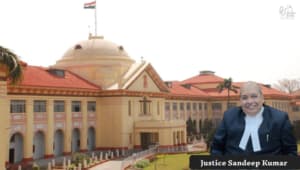The Gujarat High Court, in a recent order dated 28th July 2025, dismissed a petition seeking to quash an FIR registered against two relatives accused of abetting the suicide of a young man. The case, filed under Sections 108, 351(3), and 54 of the Bharatiya Nyaya Sanhita (BNS), highlights the serious allegations of harassment and instigation leading to the victim’s death.
Background of the Case
The petitioners, Parmar Govindbhai Sonaji and another, were named in an FIR lodged at Deesa Rural Police Station, Banaskantha. The complaint alleged that the accused had forced the deceased, Aakash, to divorce his wife, Akanksha, who was the niece of petitioner No. 1. The couple had eloped and married in January 2025, but their union faced severe opposition from the petitioners.
Read also:- Allahabad High Court Directs Expeditious Disposal of 20-Year-Old Civil Suit
After being traced by the police, Aakash and Akanksha were brought to the police station, where they executed a notarized divorce deed under alleged pressure from the petitioners. The next day, Aakash consumed acid and succumbed to his injuries. His dying declaration implicated the petitioners, stating they had harassed and threatened him, leaving him with no choice but to end his life.
Justice Hasmukh D. Suthar, while dismissing the petition, noted that the material collected during the investigation, including the dying declaration, prima facie established the petitioners’ involvement. The court emphasized that instigation need not be direct; indirect evidence could suffice to prove abetment.
"The growing culture of violence and exploitation in society sends shockwaves through the civilized world. Such incidents erode basic human values like tolerance and the spirit of 'live and let live,'" observed the court.
Read also:- SC Quashes FIR Against Lakshya Sen & Family in Badminton Age-Fraud Case
The judgment referenced several landmark rulings, including:
Lata Singh v. State of Uttar Pradesh (2006): The Supreme Court condemned violence against inter-caste marriages, calling such acts illegal and shameful.
Arumugam Servai v. State of Tamil Nadu (2011): The court affirmed an individual’s right to marry a person of their choice upon attaining majority.
Daxaben v. State of Gujarat (2022): The apex court held that indirect instigation leading to suicide constitutes abetment.
Read also:- High Court Dismisses Bail Cancellation Plea in Murder Case Due to Repeated Absence of Petitioner
The petitioners argued that they were falsely implicated and that Aakash had voluntarily divorced Akanksha. They also cited their anticipatory bail as grounds for quashing the FIR. However, the court rejected these submissions, stating that anticipatory bail does not justify quashing proceedings.
"The power to quash under Section 528 of the BNSS must be exercised sparingly, in the rarest of rare cases. The court cannot conduct a mini-trial to assess the credibility of evidence at this stage," the judgment stated.
The court further relied on Neeharika Infrastructure Pvt. Ltd. v. State of Maharashtra (2021), which outlined that quashing should be an exception, not the rule.
Case Title: Parmar Govindbhai Sonaji & Anr. vs. State of Gujarat & Anr.
Case No.: R/Special Criminal Application (Quashing) No. 3717 of 2025















